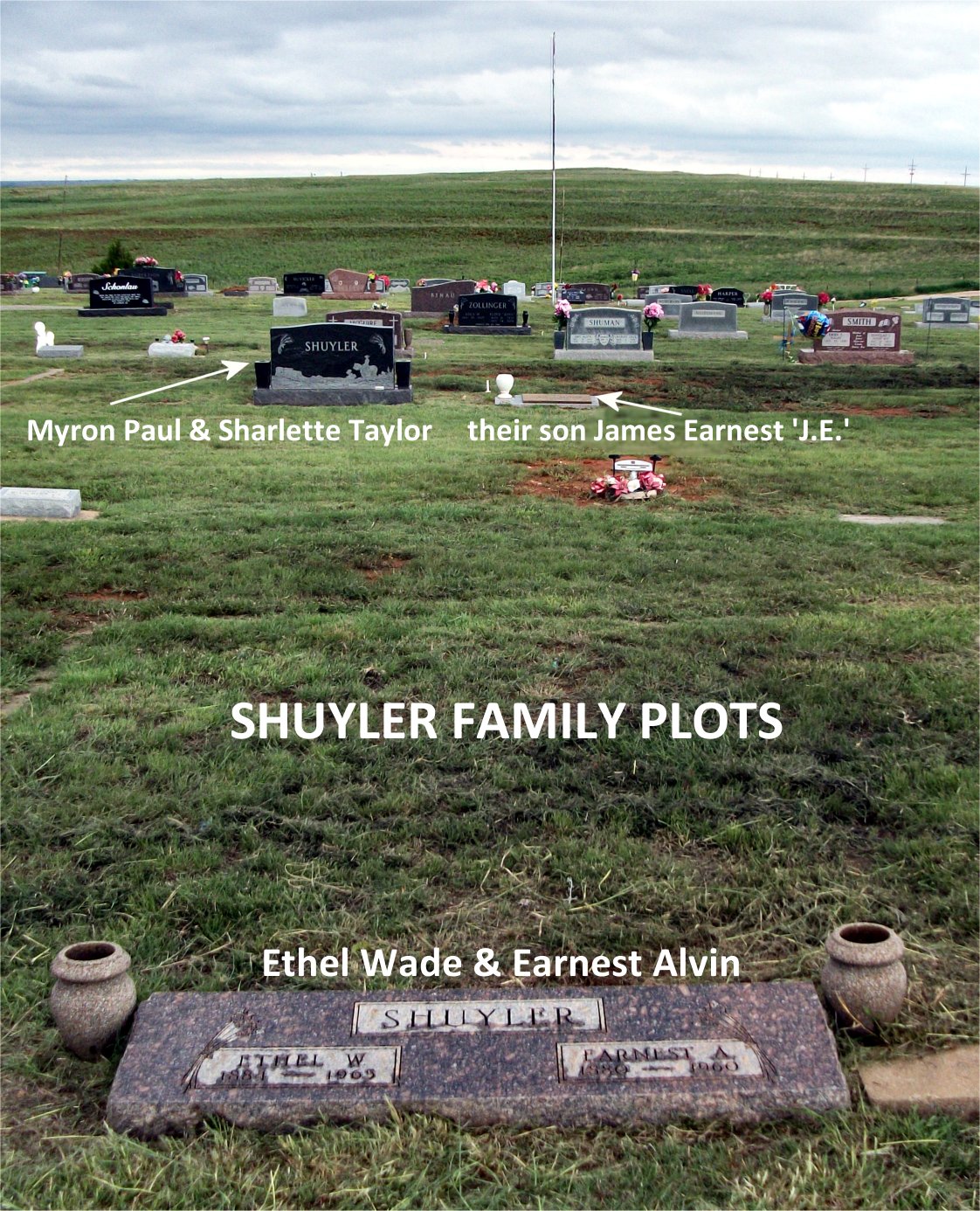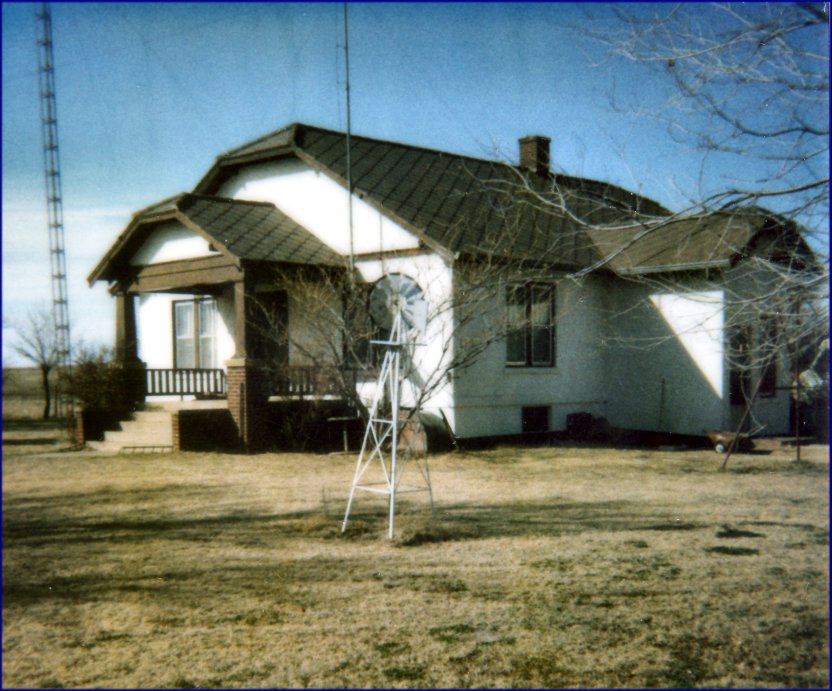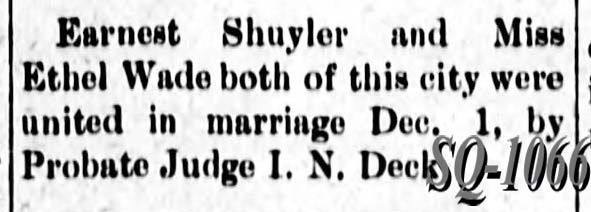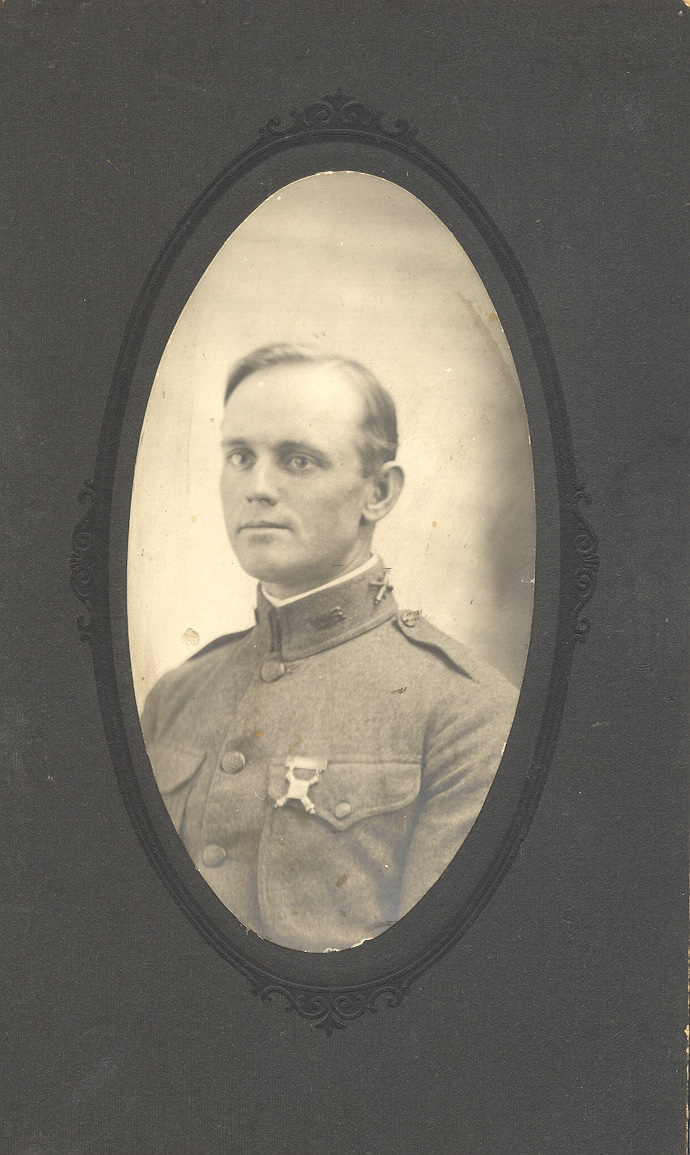They made a hillside dugout facing south, and they plowed sod strips to make bricks for their second dwelling, a sod house that is still standing as of 2013. Their family expanded to seven children total: Alma (born in Grant County), and Valma, Myron, Fred, Clinton, Merrill and Wade (all born on the homestead in Good, Harper County, OK, just southeast of Buffalo).
Earnest freighted supplies from both Fort Supply and Woodward, each one-way trip taking an entire day. He hauled all farm excess to sell: grain, produce, other crops, returning with necessities such as building materials and dry goods. After the railroad extended to Buffalo, the family acquired a car, and such tips were more frequent and faster.
He was known as an excellent carpenter and mechanic, doing his own blacksmith work, shoeing,and welding. He bought a steam threshing machine in 1908, and all the area farmers pitched in to help one another during harvest time. The family planted wheat, oats, and broom-corn as profit crops, and raised a large farm garden to provide for daily needs. They also raised sugar cane that they 'waggoned' to the sorghum mills to process for molasses, used to cure meat after the first-frost slaughter, since sugar cure, canning and cold weather were the only preservations available.
He was a true pioneer as shown by his approach to eliminating the rat population - he was tired of rats killing chickens and chewing holes in the horses' harnesses, as well as eating the grain crops. Even the kids had to make rat-war as they went out mornings to feed hay to the the cattle. Earnest made sure the house-cat, Puss, had free run in the evenings to pounce wherever she could find the rodents. Inspired by an article in the Kansas City Star, he hooked a hose to the exhaust of the Model T Ford, and routed it to the rat breeding area under the barn. He had left a rat-sized hole inside, and climbed to the hayloft to watch the results. As the rats tried to escape, Earnest bombarded the barn floor with buckshot... there were few escapees.
He was known as a good shot, and owed greyhounds his entire life. At first he hunted the marauding coyotes on horseback, and later the hounds would ride in his jalopy till he turned them out to the chase while he drove alongside, shooting all the while. On a good day, he'd get three pelts, and the satisfaction that chickens, pigs, turkeys and calves were safer.
Ernest was known as a generous and fair man. During the dust bowl and depression, Earnest and Ethel hired as many hands as their land could produce food to support. The basement of the main homestead had a large 'bunkhouse' room with bunk-beds enough to house an addition twenty folks.
He was an accomplished horseman who raised race horses - quarter horses that excelled in 'match races'. It is rumored that he imported the first aluminum horse shoe west of the Mississippi River for "Dixie Lee" ridden by Valma in a match race that saved the farm in hard times.
In his later years, he'd stock the cistern beside the house with pan fish, giving him a place to teach the grand and great-gran kids to fish with a cane pole, bobber and fresh earthworms which he'd eagerly dig from Ethel's 'pie garden' of rhubarbs and strawberries. He'd also take a flask of spirits to the farm pond and nap as the kids fished.
Lived 80 years, 9 months, 6 days, to the fullest.
They made a hillside dugout facing south, and they plowed sod strips to make bricks for their second dwelling, a sod house that is still standing as of 2013. Their family expanded to seven children total: Alma (born in Grant County), and Valma, Myron, Fred, Clinton, Merrill and Wade (all born on the homestead in Good, Harper County, OK, just southeast of Buffalo).
Earnest freighted supplies from both Fort Supply and Woodward, each one-way trip taking an entire day. He hauled all farm excess to sell: grain, produce, other crops, returning with necessities such as building materials and dry goods. After the railroad extended to Buffalo, the family acquired a car, and such tips were more frequent and faster.
He was known as an excellent carpenter and mechanic, doing his own blacksmith work, shoeing,and welding. He bought a steam threshing machine in 1908, and all the area farmers pitched in to help one another during harvest time. The family planted wheat, oats, and broom-corn as profit crops, and raised a large farm garden to provide for daily needs. They also raised sugar cane that they 'waggoned' to the sorghum mills to process for molasses, used to cure meat after the first-frost slaughter, since sugar cure, canning and cold weather were the only preservations available.
He was a true pioneer as shown by his approach to eliminating the rat population - he was tired of rats killing chickens and chewing holes in the horses' harnesses, as well as eating the grain crops. Even the kids had to make rat-war as they went out mornings to feed hay to the the cattle. Earnest made sure the house-cat, Puss, had free run in the evenings to pounce wherever she could find the rodents. Inspired by an article in the Kansas City Star, he hooked a hose to the exhaust of the Model T Ford, and routed it to the rat breeding area under the barn. He had left a rat-sized hole inside, and climbed to the hayloft to watch the results. As the rats tried to escape, Earnest bombarded the barn floor with buckshot... there were few escapees.
He was known as a good shot, and owed greyhounds his entire life. At first he hunted the marauding coyotes on horseback, and later the hounds would ride in his jalopy till he turned them out to the chase while he drove alongside, shooting all the while. On a good day, he'd get three pelts, and the satisfaction that chickens, pigs, turkeys and calves were safer.
Ernest was known as a generous and fair man. During the dust bowl and depression, Earnest and Ethel hired as many hands as their land could produce food to support. The basement of the main homestead had a large 'bunkhouse' room with bunk-beds enough to house an addition twenty folks.
He was an accomplished horseman who raised race horses - quarter horses that excelled in 'match races'. It is rumored that he imported the first aluminum horse shoe west of the Mississippi River for "Dixie Lee" ridden by Valma in a match race that saved the farm in hard times.
In his later years, he'd stock the cistern beside the house with pan fish, giving him a place to teach the grand and great-gran kids to fish with a cane pole, bobber and fresh earthworms which he'd eagerly dig from Ethel's 'pie garden' of rhubarbs and strawberries. He'd also take a flask of spirits to the farm pond and nap as the kids fished.
Lived 80 years, 9 months, 6 days, to the fullest.


















